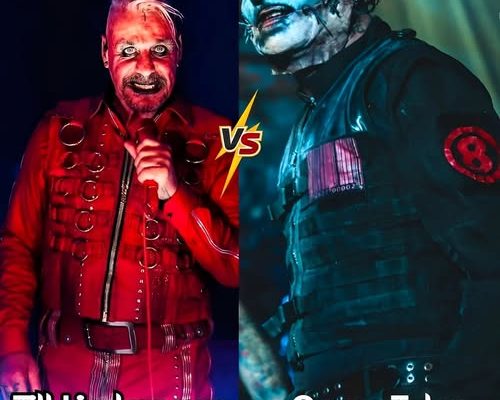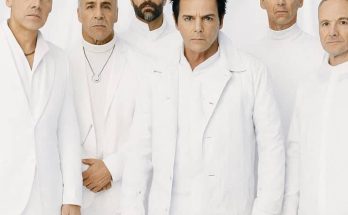Clash of Titans: Till Lindemann vs. Corey Taylor – Who Truly Reigns Supreme in Metal’s Kingdom of Fire & Fury
The world of heavy metal is vast, ferocious, and endlessly diverse, but every so often two figures rise to such heights that their very names become synonymous with the genre’s power and enduring flame. When fans argue in smoky bars, when online debates rage into the late hours, and when concert-goers stand drenched in sweat and adrenaline, two names often surface as the torchbearers of the modern era: Till Lindemann, the fire-breathing commander of Rammstein, and Corey Taylor, the ever-versatile voice behind Slipknot and Stone Sour. To place them side by side is to witness two very different but equally awe-inspiring interpretations of what it means to lead metal’s armies into battle. Lindemann brings spectacle, feral discipline, and an unyielding aura of industrial fury, while Taylor embodies chaos, versatility, and the rebellious rage of a new generation. The question of who reigns supreme is not simple—it is a clash of philosophies, aesthetics, and energies that together illuminate why both men have become icons of the genre’s kingdom of fire and fury.
Till Lindemann is the embodiment of steel-clad Germanic discipline fused with primal savagery. On stage, he is less a man and more a dark general presiding over a nation of flames, each performance crafted like a military parade through hell. Rammstein’s concerts are legend, not just for the sonic thunder of their industrial metal but for the sense of immersion Lindemann creates. Pyrotechnics, flamethrowers, explosions, and twisted theatricality are not accessories—they are weapons. Lindemann commands them with the authority of someone who knows that spectacle itself is part of the music’s DNA. His guttural voice, at once booming and sinister, cuts through the air like an ancient war chant, and even those who don’t understand a word of German feel its weight. The very cadence of his delivery strikes like hammer blows, hypnotic and brutal. Lindemann is not just singing songs—he is invoking a ritual that merges danger and seduction, a ceremony of flames in which the audience is both witness and participant.
Corey Taylor, by contrast, thrives in chaos and multiplicity. Where Lindemann’s performances feel like controlled detonations, Taylor’s are raw storms. As the frontman of Slipknot, he channels an almost feral rage that feels perpetually on the verge of collapse, yet somehow remains tethered to precision. Slipknot’s live shows are tornadoes of motion, with nine masked figures battering the senses, but at the core of it all stands Taylor, a figure of manic energy and searing voice. His vocal range is one of his greatest weapons: he can roar with ferocity, spit venom with clarity, then pivot into melodic passages that soar with vulnerability. Beyond Slipknot, Taylor’s work in Stone Sour reveals his versatility, his ability to transcend genres while never losing his metal edge. He is a shapeshifter in the kingdom of fire, proving that metal is not one note of anger but a symphony of pain, passion, rebellion, and occasional tenderness. Taylor thrives in that spectrum, his voice carrying him across it like a warrior who fights not just with rage but with adaptability.
The clash between Lindemann and Taylor is not just about sound—it is about philosophy. Lindemann represents the towering, larger-than-life force that transforms metal into a Wagnerian opera, an overwhelming total work of art where everything, from lyrics to fire to costume, is part of a grand narrative. Taylor, on the other hand, represents the raw nerve of modern disillusionment, the everyman who steps into the chaos and screams for everyone too afraid to unleash their demons. Lindemann is the sculpted titan, polished yet menacing, commanding respect by sheer presence. Taylor is the volatile revolutionary, unpredictable and human, commanding loyalty by his willingness to bleed alongside his fans. Both embody different shades of what makes metal eternal: structure and chaos, ceremony and rebellion, fire and fury.
When fans discuss supremacy, much hinges on the cultural impact each has had. Rammstein, with Lindemann as its spearhead, brought German industrial metal to global prominence. The band’s success is staggering not only in Europe but worldwide, and their songs have become anthems even for listeners who speak no German. Lindemann has turned language itself into part of the mystique—his rolling gutturals and harsh consonants lend the music a brutal authenticity that transcends translation. The band’s live shows set a standard for theatricality in metal that few can even approach. Lindemann’s fearlessness in pushing boundaries—whether through provocative lyrics, shocking stage antics, or uncompromising aesthetics—has carved him into legend. He is the iron fist of metal, immovable and monolithic, a symbol of uncompromising artistic vision.
Corey Taylor’s influence spreads in a different way. He is not just the voice of Slipknot, a band that reshaped nu-metal into something darker and more enduring, but also a figure who continually reinvents himself across projects, from Stone Sour to his solo endeavors. His lyrical voice speaks to alienation, anger, trauma, and resilience in ways that resonate with younger generations searching for catharsis. Slipknot’s brutal energy gave disaffected youth an outlet, a community where their chaos was not just tolerated but celebrated. Taylor’s presence in interviews, books, and podcasts also amplifies his cultural footprint—he is not cloaked in mystery like Lindemann but open, opinionated, and vocal about society, music, and the state of the world. In him, fans find not just a performer but a leader who speaks to them directly, often in raw and unpolished terms. His supremacy lies in his ability to channel chaos while remaining human, approachable, and endlessly adaptable.
The question of supremacy in the kingdom of fire and fury is therefore a question of what one values in metal. If the measure is sheer spectacle, domination of the stage, and the ability to turn every concert into a firestorm of ritual, then Till Lindemann is the undisputed sovereign. His reign is one of iron discipline, each performance a reminder that metal can be not just heard but experienced as a sensory assault, a theatrical masterpiece that leaves no doubt about his command. If, however, supremacy is measured by versatility, emotional range, and the ability to embody both rage and vulnerability, then Corey Taylor claims the crown. His reign is one of chaos embraced, of versatility wielded as a weapon, his voice carrying fans across genres while never losing the raw spirit of rebellion that fuels metal at its core.
But perhaps true supremacy cannot belong to one alone. Lindemann and Taylor are like opposing elements—fire forged into disciplined spectacle versus fire unleashed in anarchic freedom. One is the fortress, the immovable structure that inspires awe; the other is the wildfire, unpredictable and raw, spreading into every corner of modern music. To strip one of his crown would be to deny half of metal’s essence. Instead, the kingdom thrives because both exist. Lindemann ensures that metal remains monumental, larger-than-life, an art form that can command stadiums and shock the senses. Taylor ensures that metal remains connected to the human soul, that it evolves, adapts, and continues to scream for those who feel voiceless.
The duel between them, then, is less a matter of one triumphing over the other and more a symphony of contrasts that together keep the genre alive. Lindemann brings the fury of ancient gods, Taylor the fire of restless mortals. Together they sustain a kingdom where fans can find both transcendence and catharsis. For those who stand at the edge of a Rammstein show, engulfed in flame and thunder, Lindemann is supreme. For those screaming along with Slipknot in a pit of chaos, Taylor is the chosen king. Metal does not need one ruler—it thrives precisely because it can crown both, each ruling different provinces of its vast and fiery empire.
In the end, the clash of Till Lindemann and Corey Taylor is not about supremacy but about the endless vitality of metal itself. Their contrasting reigns prove that the genre can be both disciplined and chaotic, theatrical and raw, distant and intimate. Lindemann’s iron-clad rituals and Taylor’s chaotic anthems are two sides of the same coin, each amplifying what makes the other remarkable. Fire and fury demand many shapes, and in their clash, the kingdom only grows stronger, its flames burning ever brighter against the darkness.



